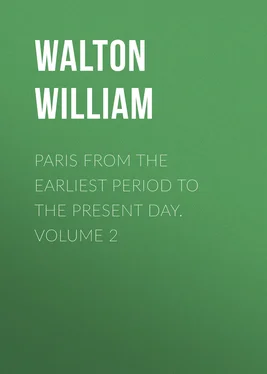William Walton - Paris from the Earliest Period to the Present Day. Volume 2
Здесь есть возможность читать онлайн «William Walton - Paris from the Earliest Period to the Present Day. Volume 2» — ознакомительный отрывок электронной книги совершенно бесплатно, а после прочтения отрывка купить полную версию. В некоторых случаях можно слушать аудио, скачать через торрент в формате fb2 и присутствует краткое содержание. Жанр: Путешествия и география, История, foreign_edu, foreign_antique, foreign_prose, на английском языке. Описание произведения, (предисловие) а так же отзывы посетителей доступны на портале библиотеки ЛибКат.
- Название:Paris from the Earliest Period to the Present Day. Volume 2
- Автор:
- Жанр:
- Год:неизвестен
- ISBN:нет данных
- Рейтинг книги:3 / 5. Голосов: 1
-
Избранное:Добавить в избранное
- Отзывы:
-
Ваша оценка:
- 60
- 1
- 2
- 3
- 4
- 5
Paris from the Earliest Period to the Present Day. Volume 2: краткое содержание, описание и аннотация
Предлагаем к чтению аннотацию, описание, краткое содержание или предисловие (зависит от того, что написал сам автор книги «Paris from the Earliest Period to the Present Day. Volume 2»). Если вы не нашли необходимую информацию о книге — напишите в комментариях, мы постараемся отыскать её.
Paris from the Earliest Period to the Present Day. Volume 2 — читать онлайн ознакомительный отрывок
Ниже представлен текст книги, разбитый по страницам. Система сохранения места последней прочитанной страницы, позволяет с удобством читать онлайн бесплатно книгу «Paris from the Earliest Period to the Present Day. Volume 2», без необходимости каждый раз заново искать на чём Вы остановились. Поставьте закладку, и сможете в любой момент перейти на страницу, на которой закончили чтение.
Интервал:
Закладка:
By an ordinance of Philippe VI, dated March 11, 1344, the personnel of the Parlement was fixed at three presidents and seventy-eight conseillers, appointed; of the latter, forty-four were ecclesiastics, and thirty-four, laymen. It was subsequently divided into seven chambers, the grand'chambre , the chambre criminelle , or la Tourelle , three chambres des enquêtes , and two chambres des requêtes . The first took cognizance of the important causes which concerned the State, the city, and the corporations; the criminal chamber sat in appeal on judgments rendered in the criminal courts (after 1515 it was given general jurisdiction); the three chambres des enquêtes decided upon the validity of appeals addressed to the Parlement, and decided as a court of last resort in processes which entailed punishments by fine; the two chambres des requêtes judged personal suits between officers of the royal household and others who, by their rank, were entitled to be judged by the Parlement. The second chambre des requêtes was instituted in 1580; they were both suppressed at the establishment of the Parlement Maupeou, in 1771. When Louis XIV recalled the Parlement, he established only a single chambre d'enquête . In 1546, the members of the Parlement enjoyed the privilege of hereditary nobility. They had the precedence over all other constituted authorities.
When the disastrous war with England broke out, under Jean le Bon, this monarch assembled at Paris the three orders of the kingdom, the clergy, the nobility, and the bourgeoisie, the latter having for their leader the prévôt of the merchants of Paris, Étienne Marcel. The equipment of an army of thirty thousand men was authorized, and a levy of five millions of livres parisis for their maintenance during a year, this money to be raised by means of the gabelle , the tax on salt, and an impost of eight deniers per pound upon everything sold, to be levied impartially upon all three orders, even the royal family not to be exempt, but—warned by past experience—the États Généraux demanded that the funds should remain in the hands of receivers appointed by them, and responsible to them only, and appointed a commission of nine of their members to supervise this measure. "This was nothing less than a revolution, for to vote and to collect the tax, to regulate it, and to supervise its distribution, this was to exercise one of the important functions of sovereignty. The deputies of 1355 began by going further than has been gone in our days under the constitutional monarchies, even under the republics."
Ten days after the battle of Poitiers, the dauphin Charles returned to Paris and convoked the États Généraux , who opened their second session on the 17th of October, 1356. This time, their demands were so increased that the dauphin, in dismay, adjourned their sittings, but the royal treasury was empty, and he was obliged to assemble them again on the 5th of the following February. The Bishop of Laon, Robert le Coq, made himself the mouthpiece of their just grievances, and was so well sustained by the prévôt , Étienne Marcel, and by Jean de Picquigny, in the name of the nobles, that resistance was impossible, and the grande ordonnance of 1357, in sixty-one articles, provided for sweeping reforms in the administration, in the finances, in the army, in the courts of law, and in the arbitrary exercise of their prerogatives by the officers of the crown. But on this occasion Paris was in advance of the rest of the nation, and the period was, moreover, most inopportune.
Charles V, called Le Sage , the son of Jean le Bon, in the midst of the numerous judicious and enlightened measures which characterized his reign, was guilty of some tyrannical and injudicious ones, and among the latter may be cited his giving to the members of the Parlement for their pay the fines which they inflicted in the course of their judgments. In the reign of his son, called Le Fou , the office of prévôt of the merchants, with all its jurisdiction, and those of the échevins , or aldermen of the city, were suppressed by letters patent, dated January 27, 1383; the king took possession of the revenues and public funds of the city, and all the exercise of jurisdiction of the Hôtel de Ville was transferred to the prévôt de Paris or to his lieutenant. The upper bourgeoisie were decimated and ruined in punishment for their rising against the young king and his uncles. Five years later, Charles VI decreed that the authority of the prévôt extended through the nation, and that he should be empowered to search malefactors anywhere in the kingdom; this power was confirmed by Charles VII in 1447. The ordinances of the prévôt relative to the provisioning of Paris were also valid everywhere, so that the central authority of the Parisian police became supreme. The prévôt was present at the royal sittings, and took his place below the grand chamberlain; he walked at the head of the nobility, enjoyed the privilege of covering himself after the calling of the first case, a privilege reserved for dukes and peers; he assigned the peers in the criminal cases, and was entitled to twelve guards, called sergents à la douzaine . On his installation in his office, he presented a horse to the president of the Parlement; his costume consisted of a short robe with a cloak, the collar turned down, a sword, a hat with plumes, and he carried his bâton of office covered with cloth of silver.
He was also charged with the preservation of the privileges of the University, and it was for this reason, as prescribed in the ordinance of 1200, that he took his oath of office between the hands of the rector of the University. In 1613, the prévôt , Louis Seguier, refused to observe this formality. He had under his orders a civil lieutenant charged with the jurisdiction of civil affairs in the first hearing, and, later, of particular civil and criminal lieutenants; these magistrates had the direction of the police until 1667, when there was created a conseiller lieutenant-général of police. The municipal police of Paris absorbed successively various jurisdictions which had previously existed, and the prévôt administered this force in the interests of the public order.
Nevertheless, the disorder in the municipal administration became so great that Charles VI, by an edict dated January 27, 1411, restored to the bourgeois , manants , and habitants of his "good city of Paris" the prevosté des marchands et eschevinage, clergie, maison de la ville, parlouer aux bourgeois, jurisdiction, coertion, cognoissance, rentes, revenus, possessions quelconques, droits, honneurs, noblesses, prerogatives, franchises, libertez et prévillèges , to have and to hold forever, as they had done before.
It was under this king that there was brought before the Parlement an important case, related at length by all the chroniclers of the time, and which may serve to illustrate the nature of the administration of justice. A certain Norman gentleman, Jean de Carrouges, residing in the château d'Argenteuil, near Alençon, having occasion to go on a journey, left his young wife at home. One of his neighbors, Jacques Le Gris, having heard of her beauty, presented himself at the castle and asked to be permitted to visit the donjon. He was cordially welcomed, invited to dinner, and the Dame de Carrouges herself conducted him to the tower. Once there, the visitor suddenly fastened the door behind them and then proceeded to avow his passion to the lady; indignantly repulsed, he threw himself upon her and inflicted upon her the last of outrages. Then, rushing down the stairs, he leaped upon his horse and effected his escape. When the Sire de Carrouges returned, he appealed for redress to the Comte d'Alençon, his suzerain and that of Le Gris; the comte summoned all the parties before him, but the accused gentleman stoutly proclaimed his innocence and endeavored to establish an alibi. The comte, unable to decide, referred the case to the Parlement at Paris; the trial lasted eighteen months, and the Parlement finally decided that the lady could prove nothing against Le Gris excepting on a field of combat jusqu'à outrance .
Читать дальшеИнтервал:
Закладка:
Похожие книги на «Paris from the Earliest Period to the Present Day. Volume 2»
Представляем Вашему вниманию похожие книги на «Paris from the Earliest Period to the Present Day. Volume 2» списком для выбора. Мы отобрали схожую по названию и смыслу литературу в надежде предоставить читателям больше вариантов отыскать новые, интересные, ещё непрочитанные произведения.
Обсуждение, отзывы о книге «Paris from the Earliest Period to the Present Day. Volume 2» и просто собственные мнения читателей. Оставьте ваши комментарии, напишите, что Вы думаете о произведении, его смысле или главных героях. Укажите что конкретно понравилось, а что нет, и почему Вы так считаете.












